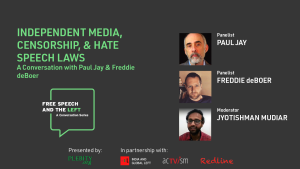
Partial screenshot of Amnesty International’s report on the war in Ukraine
Let the government do it
Suppressing and censoring speech used to mostly be the work of the government. People on the left would generally criticize and resist the power of the state to control what information they would be allowed to see, hear or read, particularly in times of war.
The Espionage Act of 1917 and the Sedition Act of 1918 were enacted during World War I to stifle the dissent that came mostly from the socialist left:
“The various acts of 1917 and 1918 were used to destroy what was left of the left wing in America. Victor Berger, the first socialist elected to Congress, was sentenced to 20 years in prison for hindering the war effort…The socialist labor leader Eugene V. Debs was sentenced to 10 years in prison for making an anti-war speech.” – The Independent
The power of those acts is still with us.
Those laws from over a hundred years ago lay somewhat dormant for decades, but in recent years they have been called back to service.
In 1971, Daniel Ellsberg was charged with violating the Espionage Act when he passed the Pentagon Papers, a Vietnam exposé, to the New York Times.
In 2013, Edward Snowden was charged under the Espionage Act of 1917 for revealing surveillance secrets of the NSA.
In 2018, Reality Winner was convicted and sentenced to over 5 years under the same laws.
Julian Assange is living under the specter of life in US prison for publishing leaks revealing US acts in Iraq.
Under President Obama there were 17 indictments under the Espionage Act of 1917, a 100 year old censorship law, more than under all past presidents combined.
More censorship, please!
As dangerous as those zombie espionage acts are, they are not our biggest threat to free speech today. Now we have media self-censorship partnered with the echo chamber of social networks, a combination which enforces rather than challenges a narrow consensus.
Amnesty International this week published a report that carefully and factually stated that the Ukrainian military was endangering civilians by stationing troops in schools, hospitals and other civilian areas.
Such tactics violate international humanitarian law and endanger civilians, as they turn civilian objects into military targets ?https://t.co/EysZtcqqci
— Amnesty International (@amnesty) August 4, 2022
The response to this report was a screaming, online mob demanding apologies, retractions and firings. Amnesty is under immense pressure to retract its report—not because the facts themselves were wrong or even contested—but because the facts didn’t suit the consensus.
CBS came out with what might have been an important story detailing the corruption and lack of accountability surrounding arms shipments going to Ukraine. According to its own tweet promoting the report (before it was taken down), CBS estimated that only 30% of arms shipments were reaching their intended recipients.
CBS claims this documentary is now "being updated" after it received a giant tsunami of trolling from those who were upset at the information being reported. The original link was taken down: pic.twitter.com/b04P5KlRC7
— Michael Tracey (@mtracey) August 8, 2022
This seems like it would be important information to assess here in the U.S. since we are supporting this war with billions of dollars that will not be available for social causes back at home.
Amnesty issued a partial apology for the ‘distress’ the report caused but laudably stuck to the findings. CBS has pulled its report, saying it was ‘making some changes’.
And the media response? In both cases articles about these two stories, and the Amnesty one in particular, were framed not around the substance of the facts themselves, but rather in terms of how they mirrored Russian propaganda and enraged the Ukrainian government. In other words, they were criticized because they diverged from the consensus.
But we really can’t blame the media. We get what we ask for. And what we ask for is to not be told the facts we don’t want to hear.
“Journalists come and see how corrupt everything is and that the soldiers have nothing, but none of this is reflected in mainstream reporting. It’s very well known but it’s just not getting past the filter of western media.” –Lindsey Snell on Useful Idiots
There are some notable exceptions to this unfortunate trend. Lindsey Snell recently posted an important piece of independent journalism on the site ishgal.com. She spent time on the ground in Ukraine meeting with numerous foreign volunteers and members of the Ukrainian military. In spite of the Ukrainian government’s attempts to control who she spoke with, she did what journalists used to do—go out on their own, investigate, and report what they see and hear.
Snell came back with an important story of a demoralized and poorly equipped military. As one of the volunteers said to her: “I suppose it’s not the story people want to hear, but the gap between how the war is shown in the media and the reality of the place is kind of ridiculous,” Sam, foreign volunteer in Ukraine.
Nevermind, we’ll censor ourselves.
Censorship used to be government work, but now it’s been privatized like everything else in our neo-liberal world. We do it ourselves, to ourselves–through media self censorship reinforced by online mobs.
This absence of a critical media makes the role of NGOs like Amnesty International, whistleblowers like Snowden and Reality Winner, and the few remaining independent journalists like Lindsey Snell more important than ever before.
Instead of valuing facts, we reject them
We’ve traded away our critical thinking abilities for a bland porridge of consensus where we demand that what we hear always reinforces what we want to hear.
Today information about a warzone is ‘managed’ by embedded journalists and PR controlled reporting. When the consensus is challenged, such as in the case of the Amnesty report, the online mob steps in to demand more censorship and call for the heads of those who dared to pop their bubble.
For those who may think it’s a very good thing now to reject even seeing facts that might cast doubt on a just cause, you can be sure to find yourselves defenseless when this weapon is someday turned against you. The only protection against disinformation is not to censor, but to value and nurture a culture of facts and objective reporting, even if that also means that you may not always like the conclusions.



